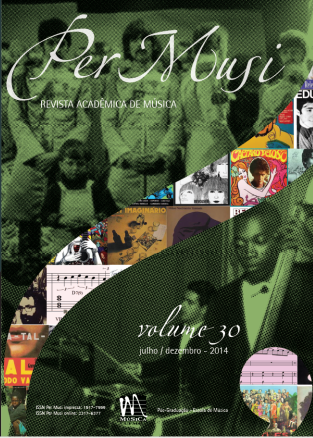Os anjos de Charly
entre o ser nacional ideal do Processo Reorganização Nacional de Reorganização e o ser real de rock nacional argentino
Palavras-chave:
Rock e ditadura, Rock na Argentina, Charly García e A MáquinaResumo
Este trabalho analisa o discurso do ser nacional ideal, que o regime militar argentino tentou impor pela força, em contraste com o ser nacional real que eles o verdadeiro ser nacional com o qual a letra das canções de Charly García contrastava. contra o papel tradicional das esposas obedientes e e filhas bombardeadas pelo discurso oficial, nas canções de La Máquina de Hacer Pájaros, as mulheres foram protagonistas: heroínas, heroínas, deusas, heroínas, heroínas, heroínas, heroínas, heroínas, heroínas, heroínas, heroínas, heroínas. foram protagonistas: heroínas, deusas e dançarinas. Em vez do "anjo do lar" proposto pelo Processo, os "anjos" nas canções de García são as mulheres independentes do lar. As canções de García são as mulheres independentes do século 20.
Referências
ALABARCES, Pablo. Entre Gatos y Violadores. El rock nacional en la cultura argentina. Buenos Aires: Colihue, 1995.
ARANCIBIA, Ernesto. Casa de muñecas. Estudios San Miguel, 1943.
AVELLANEDA, Andrés. Censura, Autoritarismo y Cultura: Argentina 1960–1983. 2 vols. Junín, Buenos Aires: Centro Editor de América Latina, 1986.
_____. “El discurso de censura cultural en la Argentina, 1960–1983: Notas para su análisis.” Pailler, Claire, Les Amériques et l’Europe: Voyage-Emigration-Exil. Toulouse: Univ. de Toulouse-Le Mirail, 1985, p.185–207.
BELTRAN FUENTES, Alfredo. La ideología autoritaria del rock nacional. Buenos Aires: Ceal, 1996.
BLAUSTEIN, Eduardo y Martín ZUBIETA. Decíamos ayer: La prensa argentina bajo el Proceso. Buenos Aires: Ediciones Colihue, 2006.
CLARIN. Suplemento especial, 24 marzo 2006.
CLARIN, Diario argentino. Buenos Aires, 3 de diciembre de 1976.
DENTE, Miguel Angel. Transgresores: Spinetta/ García/ Páez. Buenos Aires: Distal, 2000.
FAVORETTO, Mara. Alegoría e ironía bajo censura en la Argentina del Proceso (1976–1983) New York: Edwin Mellen Press, 2010.
FAVORETTO, Mara y Timothy WILSON. “‘Entertaining’ the Notion of Change: The Transformative Power of Performance in Argentine Pop.” Popular Entertainment Studies 1.2, 2010, no pag.
FEITLOWITZ, Marguerite. A lexicon of Terror: Argentina and the Legacies of Torture. New York, Oxford U P, 1998.
FOSTER, Davis William. Violence in Argentinean Literature: Cultural Responses to Tyranny. Columbia and London: University
of Missouri Press, 1995.
FRITH, Simon. “Music and Identity” Questions of Cultural Identity, Hall, S. y Paul du Gay eds. Los Angeles, London, New
Delhi, Singapore, Washington DC: Sage, 1996.
GRINBERG, Miguel. Cómo Vino La Mano. Orígenes Del Rock Argentino. Buenos Aires: Gourmet Musical Ediciones, 2008.
Print.
INVERNIZZI, Hernán. Los libros son tuyos: Políticos, académicos y militares: la dictadura en Eudeba. Buenos Aires: Eudeba,
INVERNIZZI, Hernán y Judith GOCIOL. Un golpe a los libros: Represión a la cultura durante la última dictadura militar.
Buenos Aires: Eudeba, 2002.
KAMIN, Bebe. Adios Sui Generis (Film Documentary of the Sept. 5, 1975 Concert in Luna Park). MBC Producciones, 1975.
KLEIN, Naomi. The Shock Doctrine: The Rise of Disaster Capitalism. New York: Metropolitan Books, 2007.
LA PRENSA, Diario argentino, Buenos Aires: 19 de junio de 1976.
LA RAZON, Diario argentino, Buenos Aires: 3 de diciembre de 1976.
MARCHI, Sergio. No digas nada. Una vida de Charly García. Ed. Actualizada. Buenos Aires: De Bolsillo, 2007.
MASSERA, Emilio. El Camino a la democracia. Caracas: El Cid Editor, 1979.
OLIVERI, Marcelo. Eramos tan hippies, Buenos Aires: Corregidor, 2007.
PISTOCCHI, Jorge. “Entrevista con Charly Garcia.” Expreso Imaginario. Diciembre 1981, p.24–28.
PUJOL, Sergio. Rock y dictadura: Crónica de una generación (1976–1983). Buenos Aires: Emecé Editores, 2005.
REVISTA GENTE, Buenos Aires: Editorial Atlántida: 6 de diciembre de 1976.
_____. 9 de junio de 1977
SANCHEZ, Jorge. Leyendas del rock. Charly García-1a ed. Clarín. Buenos Aires: Arte Gráfico Editorial Argentina S.A., 2007.
TAYLOR, Diana. Disappearing Acts: Spectacles of Gender and Nationalism in Argentina’s “Dirty War.” Durham: Duke University Press, 1997.
URIARTE, Claudio. Amirante Cero: Biografía no autorizada de Emilio Eduardo Massera. Buenos Aires: Planeta, 1991.
VILA, Pablo. “Rock nacional and Dictatorship in Argentina.” Popular music. 6.2 (1987): 129–148.
WILSON, Timothy. “Starmakers: Dictators, Songwriters, and the Negotiation of Censorship in the Argentine Dirty War.” A Contracorriente. 6.1 (2008), 50–75.
_____. “Argentina’s Proceso: Societal Reform through Premeditated Terror.” The Development of Institutions of Human Rights: A Comparative Study. Eds. Lilian Barria and Steven Roper. New York: Palgrave Macmillan, 2010.
Discografía
GARCIA, Charly. La Máquina de Hacer Pájaros. La máquina de hacer pájaros. Microfon, Sony BMG, 1976.
_____. La Máquina de Hacer Pájaros. Películas. Microfon, Sony BMG, 1977.
_____. Serú Girán. Serú Girán. Music Hall, 1978.
_____. Serú Girán. La grasa de las capitales. Music Hall, 1979.
_____. Sui Generis. Vida. Microfón, Sony BMG, 1972.
_____. Sui Generis. Confesiones de invierno. Microfón, Sony BMG, 1973.
_____.Sui Generis. Pequeñas anécdotas sobre las instituciones. Microfón, Sony BMG, 1974.
_____.Sui Generis. Adiós Sui Generis I. Microfón, Sony BMG, 1975.
_____.Sui Generis. Adiós Sui Generis II. Microfón, Sony BMG, 1975.
Sitios electrónicos
Dirección General de Cultura y Educación de la Provincia de Buenos Aires. ABC.gov.ar. http://www.elhistoriador.com.ar/documentos/dictadura/proclama_del_24_de_marzo_de_1976.php
Nuncamas.org. “Directive No. 604/79 of the Commander-in-Chief of the Army” (Continuation of the Offensive against Subversion), May 1979.” Doc. 54. April 2009. http://www.nuncamas.org/document/militar/60479.htm
PIGNA, Felipe. Interview with Charly Garcia. “Que fue de tu vida: Felipe Pigna y Charly Garcia” Buenos Aires, Canal 7, Jan. 19, 2012. http://www.youtube.com/watch?v=uzz8CsMqNp8
Downloads
Publicado
Edição
Seção
Licença
Copyright (c) 2014 Per Musi

Este trabalho está licenciado sob uma licença Creative Commons Attribution 4.0 International License.

Exceto onde está indicado, o conteúdo neste site está sob uma Licença Creative Commons - Atribuição 4.0 Internacional.












